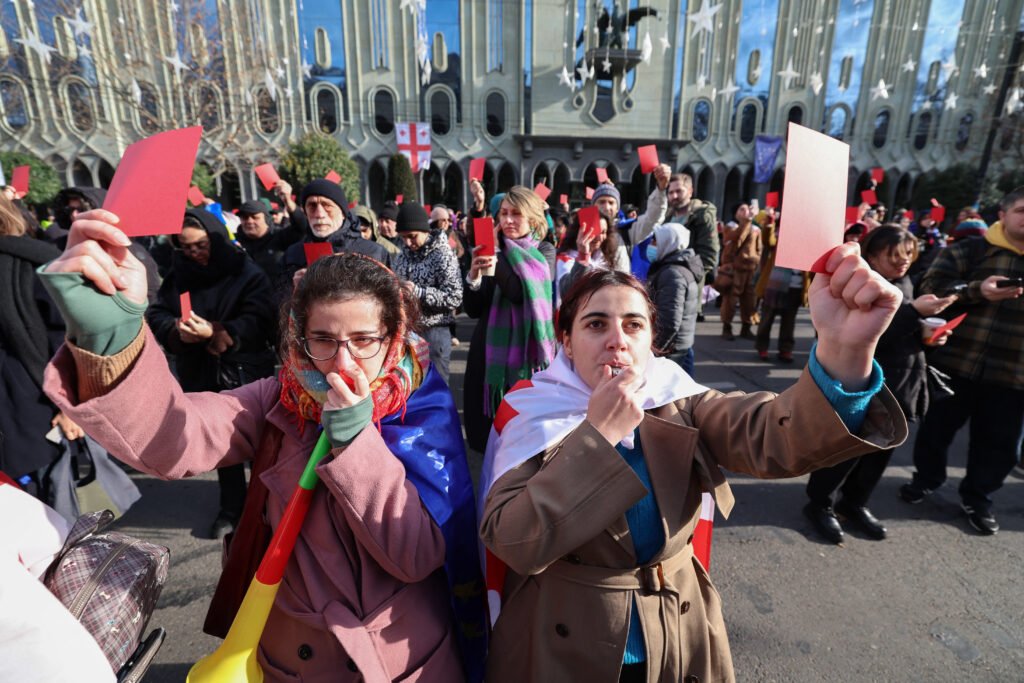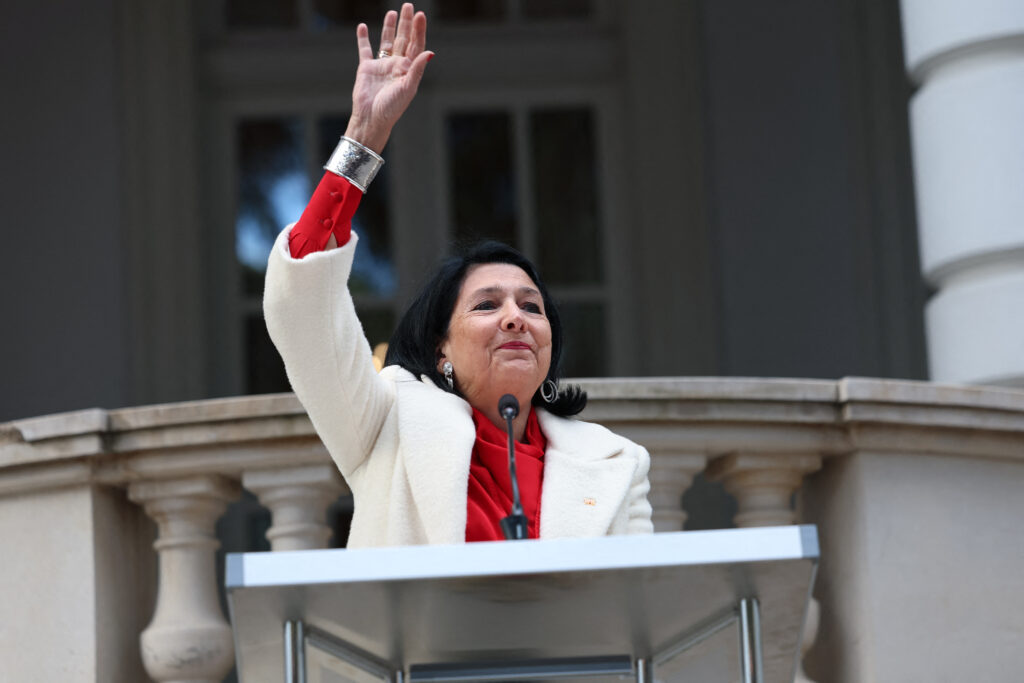Brussels–The change of guard at Georgia’s top leadership that took place yesterday (Dec. 29) in Tbilisi was relatively peaceful, though its consequences remain unclear. As former soccer player Mikheil Kavelashvili was sworn in as the new president of the republic, thousands of citizens continued to protest for the 32nd consecutive day against him and the Georgian Dream Government. Salomé Zourabichvili, whose term as head of state expired yesterday, left the presidential residence, allowing her successor to take office, but continues not to accept its legitimacy.
Kavelashvili’s inauguration
In his inauguration speech, pronounced Sunday morning in front of deputies and protected by a host of security officers, Mikheil Kavelashvili promised to be “the president of everyone, regardless of whether they like me or not.” He called on the small Caucasian country to unite around him and “the shared values, the principles of mutual respect, and the future we should build together.” After taking the oath of office, he praised “the traditions, values, national identity, sacredness of family and faith.”
In fact, during the ceremony held in an armored hemicycle, the new head of state addressed only the elected members of Georgian Dream, the governing party founded by pro-Russian oligarch Bidzina Ivanishvili (who applauded in the front row alongside Prime Minister Irakli Kobakhidze) in power continuously since 2012. The deputies from opposition parties boycotted the work of the House, refusing to occupy their seats since the Oct. 26 disputed election, which they denounced as irregular following reports from local and international observers (including those of the OSCE).

Who is the new president
Kavelashvili, 53, is a former soccer player and former member of parliament, elected in 2016 with Georgian Dream. In 2022, he founded his own movement, Power of the People, characterized by a particularly aggressive anti-Western rhetoric. An ultranationalist, he is one of the first signatories of the so-called “Russian law,” a measure (a rough copy of a similar one in force in the Federation) that opposition forces and civil society organizations branded as repressive, which forces entities that receive at least one-fifth of their funding from abroad to declare themselves “agents of a foreign power.”
That law, adopted by Parliament — which is dominated by Georgian Dream — last spring despite mass protests and bypassing the veto of then-President Salomé Zourabichvili, led the European Council to formalize in the early summer to freeze Tbilisi’s path to EU membership.
Human chain
The changing of the guard at Orbeliani Palace, elected as the seat of the presidency by Zourabichvili in 2018, came a month and a day after the controversial decision that Premier Kobakhidze announced on Nov. 28 to suspend accession negotiations to the European club “until 2028.” Since then, for four weeks, Georgians have taken to the streets of the capital and other cities to protest the government and its policy choices, which they fear will bring the country increasingly into the Kremlin’s orbit and further away from Brussels (despite EU membership being a goal enshrined in the Constitution).
So, on Saturday, Dec. 28 (exactly one month after the protests began), human chains (dubbed “chains of unity”) composed of several thousand people formed along the streets of Tbilisi and other cities as a sign of non-violent opposition to Kavelashvili’s inauguration and to demand the release of detainees arrested during protests of the past weeks.
Protesters in Georgia formed a “Chain of Unity” by standing hand-in-hand to symbolise solidarity and support for the country’s EU aspirations. Similar events occurred in other major cities.
Live updates: https://t.co/Mw3PVNhKGL pic.twitter.com/xnQNgQUxlH
— OC Media (@OCMediaorg) December 28, 2024
The images from above of the protestors holding hands, waving national flags with the five crosses and those with the twelve stars of the EU (and waving red cards to expel metaphorically Kavelashvili), are reminiscent of those of another human chain, also carried out in opposition to Moscow: the so-called “Baltic chain” of August 23, 1989, when 2 million citizens of the then Soviet republics of Estonia, Latvia, and Lithuania formed a peaceful cordon that extended from Tallinn to Vilnius.
Zourabichvili’s step to the side
With Kavelashvili’s inauguration, Ivanishvili’s partymachine has virtually completed the capture of the Georgian state, now holding parliament, the government, and the Presidency of the Republic in its grip. The 72-year-old Salomé Zourabichvili, who had held that role since 2018 and was also the first woman president and the last one elected by direct vote through universal suffrage, has in recent months become the figure around whom the parliamentary opposition forces and that part of society that does not want to see Tbilisi slide toward Moscow, as she emphasized in a recent speech to the European Parliament in Strasbourg.
The former president, a descendant of a family of exiles who escaped from the Soviet invasion of Georgia in 1921 by taking refuge in Paris, has repeatedly said in recent weeks that she does not accept as legitimate the election of her successor, as in her view, the parliament that named it on December 14 was illegitimate. That of the past few months has been a U-turn in her presidency, which began six years ago with the support of the Georgian Dream (and low popularity). In the last stretch of her term, Zourabichvili was openly critical of the government and its increasingly markedly authoritarian and pro-Russian tendencies, putting herself forward as the last bastion in defense of Tbilisi’s European path and gaining increasing public favor.

Yesterday, she declared that she would leave her residence but affirmed for the umpteenth time that she still retains herself as the “real” president of the country. “I will leave here. I will come to you, and I will be with you,” she said, addressing the crowd gathered in front of Orbeliani Palace, reiterating that “this building has only been a symbol as long as there has been a legitimate president.” “I bring with me legitimacy. I bring with me the flag. I bring with me your trust,” she concluded before joining her supporters. She called Kavelashvili’s inauguration, which was being celebrated at the same time, a “travesty” of democratic processes.
It doesn’t end here
However, Zourabichvili’s move only seemingly lowers the temperature of the political confrontation at the Caucasian country’s top institutions. While it is true that there was not the showdown that some observers expected – perhaps with the outgoing president blatantly arrested by the police – it is equally true that there is room in Georgia for only one head of state. The showdown between the executive and pro-EU opposition forces, led by Zourabichvili, is therefore only postponed.
In the meantime, Tbilisi’s slide toward Russia has triggered unilateral sanctions by some countries — such as the United States and the Baltics — which have taken restrictive measures against the Georgian Dream executives and security apparatus responsible for the violence on protesters but not by the 27 member states. The most that Brussels succeeded in doing — because of the vetoes of Hungary and Slovakia — was remove visa facilitation for short stays in the EU from which Georgian diplomats benefited.
English version by the Translation Service of Withub







